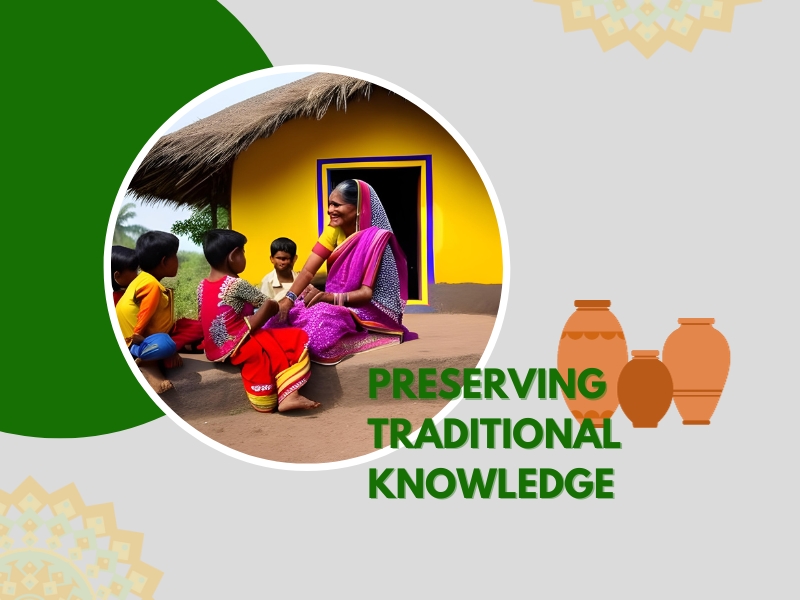Traditional knowledge, like the ancient wisdom passed down through generations, is a living testament to the resilience and ingenuity of human cultures across the globe. It represents the collective wisdom of our ancestors, encapsulating their deep understanding of the natural world, sustainable practices, medicinal remedies, and the art of harmonious living. In this blog post, we embark on a journey through the corridors of tradition, where the whispers of time-honoured practices, customs, and beliefs echo. We will not only explore why traditional knowledge is so vital in our rapidly changing world but also shed light on the compelling reasons why it should be zealously preserved. Additionally, we will uncover the captivating role of ethnic stories in safeguarding this precious heritage and delve into how traditional knowledge isn’t merely a part of culture but a cornerstone upon which societies have thrived for centuries.
Understanding Traditional Knowledge
Traditional knowledge is a treasure trove of accumulated wisdom that spans generations and is deeply rooted in culture. It encompasses a vast spectrum of practices, beliefs, skills, and insights, often transmitted orally or through practical demonstrations. This body of knowledge touches upon nearly every facet of human existence, from sustainable farming techniques honed over centuries to intricate herbal remedies for ailments. It guides communities in understanding their natural surroundings and fosters a profound connection with the environment. Furthermore, it delves into the spiritual and philosophical realms, offering guidance on how to lead a meaningful and balanced life. Traditional knowledge is a reflection of the collective intelligence of our forebears, serving as a timeless source of guidance and inspiration. In today’s rapidly changing world, understanding and preserving this knowledge is not just a cultural imperative but also a pragmatic necessity.
The Relevance of Traditional Knowledge
Traditional knowledge remains profoundly relevant in our contemporary world, offering a treasure trove of sustainable solutions to a range of modern challenges. This age-old wisdom, honed over centuries, provides insights into living in harmony with nature and adapting to changing circumstances. It’s not just a relic of the past; it’s a living repository of solutions that can address issues like climate change, biodiversity conservation, and food security. Moreover, traditional knowledge is integral to cultural identity. It represents the essence of communities, their history, and their values. It’s a source of pride and connection to one’s roots. By preserving and respecting traditional knowledge, we acknowledge the wisdom of our ancestors and gain a holistic understanding of the environment, fostering a sense of stewardship for the planet. In a world often characterized by rapid change, this ancient knowledge offers stability, sustainability, and a profound connection to our heritage.
Preservation of Ecological Balance
The preservation of traditional knowledge is closely intertwined with the preservation of ecological balance and biodiversity. Indigenous cultures around the world have developed a deep understanding of their local ecosystems over generations. This knowledge includes insights into the behaviour of plants, and animals, and the intricate relationships within ecosystems. It encompasses sustainable agricultural practices, herbal medicine, and conservation methods that have enabled these communities to coexist harmoniously with nature for centuries.
In an era where environmental degradation and loss of biodiversity are pressing global concerns, this traditional wisdom holds immense value. It offers alternative approaches to resource management, ones that prioritize long-term sustainability over short-term gains. By safeguarding and incorporating this knowledge into contemporary conservation efforts, we can not only protect fragile ecosystems but also learn valuable lessons about how to mitigate the impact of climate change and preserve the delicate balance of our planet. In essence, the preservation of traditional knowledge is a critical step towards ensuring a healthier, more biodiverse Earth for future generations.
Cultural Identity
Cultural identity is intricately tied to traditional knowledge. For many indigenous and local communities, their traditional knowledge systems are not just a repository of practical wisdom but a profound reflection of their identity and heritage. These knowledge systems encompass a wide array of practices, beliefs, rituals, and stories that have been passed down through generations. They are the threads that weave the cultural fabric of these communities, shaping their worldviews, values, and social structures.
Preserving traditional knowledge is vital for maintaining cultural diversity and preventing the erosion of unique traditions. It strengthens the bonds within communities, fostering a sense of belonging and pride in their cultural heritage. Additionally, it allows these communities to engage with the wider world while retaining their distinctiveness. In an era of globalization, where cultures often face the risk of homogenization, the preservation of traditional knowledge becomes a powerful tool for celebrating and safeguarding the rich tapestry of human diversity.
Oral Traditions and Storytelling
Oral traditions and storytelling serve as the living vessels of traditional knowledge. They are the bridges that connect the wisdom of the past with the present and future. These stories, often rich in symbolism and metaphors, encapsulate generations of accumulated knowledge in memorable narratives. They are not just tales for entertainment; they are repositories of practical wisdom, cultural values, and historical accounts.
One of the remarkable aspects of oral traditions and storytelling is their accessibility and inclusivity. They transcend the boundaries of literacy and formal education, making them an effective means of transmitting knowledge across generations. Through the art of storytelling, elders pass down insights about agriculture, healing practices, ecological understanding, and societal norms to the younger members of the community. The power of these stories lies in their ability to evoke emotions, spark curiosity, and create a sense of connection to one’s heritage.
Moreover, ethnic stories often serve as cautionary tales, preserving the lessons learned from the past. They instil a sense of responsibility towards the environment, community, and the broader world. In essence, these narratives are the heartbeats of traditional knowledge, keeping it alive and thriving in the hearts and minds of people.
Ethnic Stories as Educational Tools
Ethnic stories are not just tales of the past; they are living educational tools that continue to shape the minds and values of communities. These narratives serve as dynamic repositories of traditional knowledge, transcending the boundaries of time and formal education.
One of the most striking aspects of ethnic stories is their ability to impart wisdom through engaging and relatable narratives. They often carry profound moral lessons, teaching individuals how to navigate life’s challenges while upholding cultural values and ethics. Whether it’s a story about respecting nature’s balance or a parable on the importance of community harmony, these tales offer guidance on living a meaningful and responsible life.
These stories are particularly effective in the education of children. Through storytelling, young minds are not only exposed to practical knowledge about their environment, traditions, and heritage but also imbued with a strong sense of identity and belonging. This blend of knowledge and values helps children grow into responsible, culturally aware individuals who are well-equipped to contribute positively to their communities.
Moreover, ethnic stories promote intergenerational bonding. As elders share these narratives with younger generations, a sense of continuity is established, ensuring that traditional knowledge remains vibrant and relevant in an ever-changing world. In this way, ethnic stories continue to be powerful educational tools that bridge the wisdom of the past with the aspirations of the future.
Safeguarding Language
Safeguarding language is intricately linked with the preservation of traditional knowledge. Many indigenous cultures pass down their wisdom and practices through their native languages. These languages are repositories of age-old insights into the environment, agriculture, medicine, and spirituality. As these languages face the risk of extinction due to globalization and cultural assimilation, the knowledge they carry is also threatened. Therefore, preserving traditional knowledge goes hand in hand with protecting linguistic diversity. By ensuring that these languages are spoken, taught, and documented, we not only safeguard the rich cultural heritage embedded within them but also maintain access to a profound repository of traditional wisdom that can benefit our understanding of the world and its intricate complexities.
Fighting Cultural Erosion
Fighting cultural erosion is one of the paramount reasons for preserving traditional knowledge. In our increasingly globalized world, traditional practices, beliefs, and wisdom are often overshadowed by more dominant and standardized cultures. This erosion threatens the very essence of diverse cultures, as younger generations may lose touch with their heritage. By safeguarding and transmitting traditional knowledge, communities can maintain their distinct identities and cultural legacies. It’s a means of ensuring that the richness and uniqueness of each culture continue to thrive in a world that sometimes values uniformity over diversity. Preserving traditional knowledge is, therefore, a vital step in the ongoing battle against the homogenizing forces of globalization, allowing cultures to flourish and evolve while holding onto their invaluable heritage.
Holistic Well-being
Traditional knowledge provides holistic approaches to well-being, emphasizing the intricate connection between the mind, body, and the natural world. Unlike some modern medical practices that may isolate health factors, traditional systems often recognize that well-being cannot be compartmentalized. These systems promote balance, not just within the individual but also with the environment. They view health as a state of harmony with nature and a reflection of one’s mental, emotional, and physical equilibrium. By understanding the interplay between these elements, traditional knowledge offers comprehensive approaches to well-being that encompass not only the absence of disease but the cultivation of vitality, resilience, and a deep sense of interconnectedness with the world around us.
International Collaborations
International collaborations aimed at safeguarding and promoting traditional knowledge signify a global recognition of its importance. Indigenous communities, who are the custodians of this invaluable wisdom, often collaborate with international organizations, governments, and NGOs to preserve their knowledge. These partnerships involve documenting traditional practices, supporting community-led initiatives, and respecting intellectual property rights related to traditional knowledge. By working together, these collaborations not only help protect this heritage from exploitation and misappropriation but also ensure that it continues to benefit humanity at large. Furthermore, these efforts enable the exchange of insights between different cultures, fostering mutual understanding and respect while contributing to the preservation of the world’s rich cultural tapestry.
Conclusion
In conclusion, traditional knowledge stands as a timeless source of wisdom that bridges the past with the present and guides us into the future. It’s far from being a relic; instead, it’s a living, dynamic resource with immense practical relevance in addressing contemporary challenges. The preservation of traditional knowledge is vital not only for sustaining cultural identities but also for maintaining ecological balance and promoting holistic well-being. Ethnic stories, serving as carriers of this invaluable knowledge, play a pivotal role in ensuring that these treasures are not lost to time. They serve as bridges between generations, fostering a deep connection to our heritage and allowing the wisdom of our ancestors to continue guiding us in navigating the complexities of the modern world.

